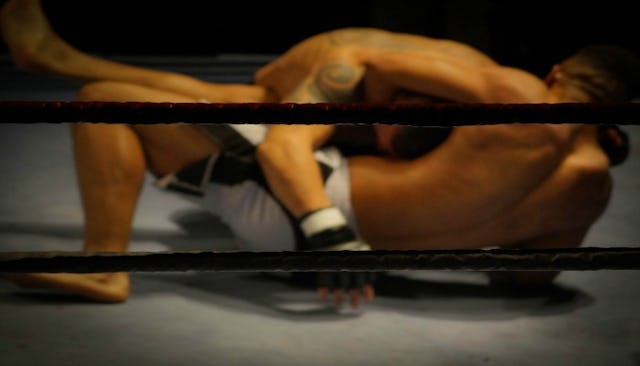The Kids Are Roughhousing Again, And I Don't Care

I hear a mild crash followed by a thunk and then loud giggles. There’s another muffled crash and then what sounds like small people rolling on the ground.
“Stop sitting on me! Stop sitting on me!” yells the 6-year-old, and the 4-year-old cackles. I hear another thunk.
The kids are beating each other again. And I’m letting it happen.
I have three boys. My husband is the roughhousing kind of dad — the kind who dangles the kids upside down and encourages them to make an “alligator stack” on his back, one on top of the other according to age. He tickles them and tackles them and does this thing they call “sloth” where they hold onto his arm with all four limbs and he swings them around.
I don’t do that stuff, but I am always hugging them and touching them. There’s always a kid worming his way onto my lap. I’m usually toting around the almost 3-year-old baby of the family. They fight to sit next to me on the couch. We hold hands — even my 6-year-old — when we don’t really have to, like in Target or walking down the sidewalk. Basically, we’re a very physical family.
Because my husband roughhouses with the kids, it’s natural that they roughhouse with each other. A game of burrowing under the covers turns into them baby-punching each other. They sit on each other, roll around on the floor, and push one another. They even sleep cuddled together like kittens. Sometimes one of them yowls and they stop. They stay away from the face and the genitals. They don’t bite. They know each other’s boundaries well.
So I let them play rough. I figure it’s good for them.
And research backs that up. Touch releases oxytocin, which plays a role in social behavior. According to Psych Central, it increases trust, reduces fear, and increases empathy. Oxytocin also helps reduce stress and anxiety. Moreover, in their book The Art of Roughhousing and Why Kids Need It, authors Anthony T. DeBenedet, M.D., and Lawrence J. Cohen make several important arguments about why kids need to roughhouse with each other. They claim it makes them smarter, helps develop skills in reading others’ emotions, and makes kids ethical and moral — all good reasons to let kids wrestle each other.
My sons know instinctually which friends they can roughhouse with, the same way they know when to keep their hands off their brothers. Some kids just aren’t into rough play, and my kids can adapt to that. They have one family of friends who have probably never laid a hand on each other in their lives, and they know it. They aren’t going to tackle or play rough with those kids. On the other hand, my oldest son has a friend who plays takedown just as much as his brothers. His mother once freaked out and mistook normal roughhousing for him trying to drown my son. Nope, it’s just regular wrestling with lifejackets on and heads above the water.
This isn’t normal parental behavior in this day and age. The rise of helicopter parenting has made everyone hyperaware of the possibility of injury, so two kids rolling on the floor and kicking at each other looks dangerous. Moreover, parents see every injury as having a direct and specific cause. If that cause is two kids wrestling with each other, well, it’s the parents’ fault for letting them go at it. Roughhousing, therefore, becomes the purview of bad kids and bad parents. Instead of letting her kids tumble on the floor, the good parent teaches them to “keep your hands to yourself.”
So I get dirty looks on the playground when my kids start tackling each other or battling with sticks. What those Judgy McJudgersons don’t understand is that I don’t let my kids wrestle in anger. They aren’t allowed, for example, to battle over a bucket in the sandbox or hit each other because they’re mad. When that starts, I intervene. That’s not the type of wrestling we allow. And we don’t allow wrestling when both parties aren’t consenting. That’s not the good kind of wrestling that releases oxytocin. That’s the bad kind. We call that fighting.
So as long as both parties are consenting, helicopter parents be damned. My kids are going to wrestle each other, roughhouse, and generally brawl as much as they want. I’m not going to stop them. And I shouldn’t have to.
[free_ebook]